外研版高中英语选修7 Module 3 Literature Reading 课件(共74张PPT)
文档属性
| 名称 | 外研版高中英语选修7 Module 3 Literature Reading 课件(共74张PPT) | 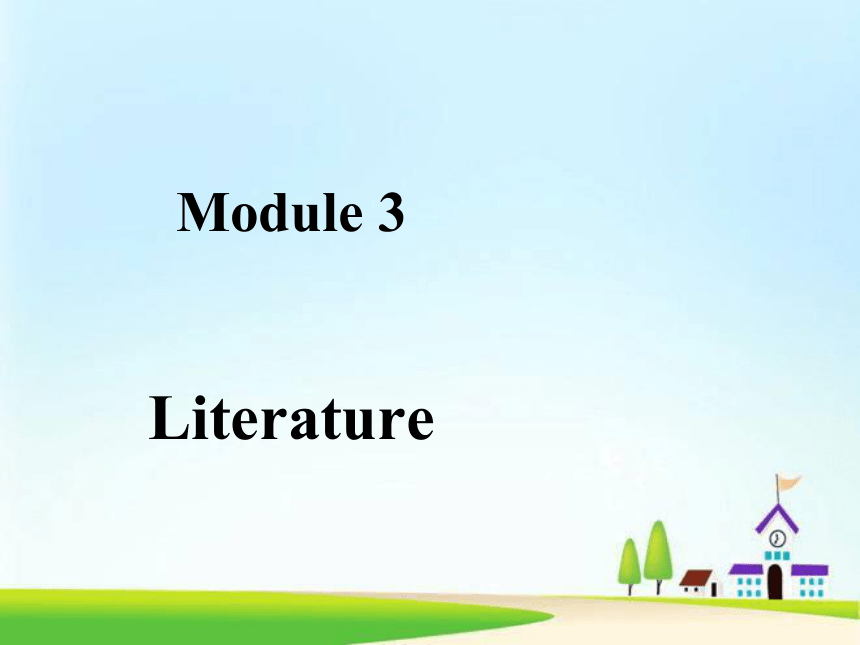 | |
| 格式 | zip | ||
| 文件大小 | 2.9MB | ||
| 资源类型 | 教案 | ||
| 版本资源 | 外研版 | ||
| 科目 | 英语 | ||
| 更新时间 | 2019-06-10 06:19:25 | ||
图片预览

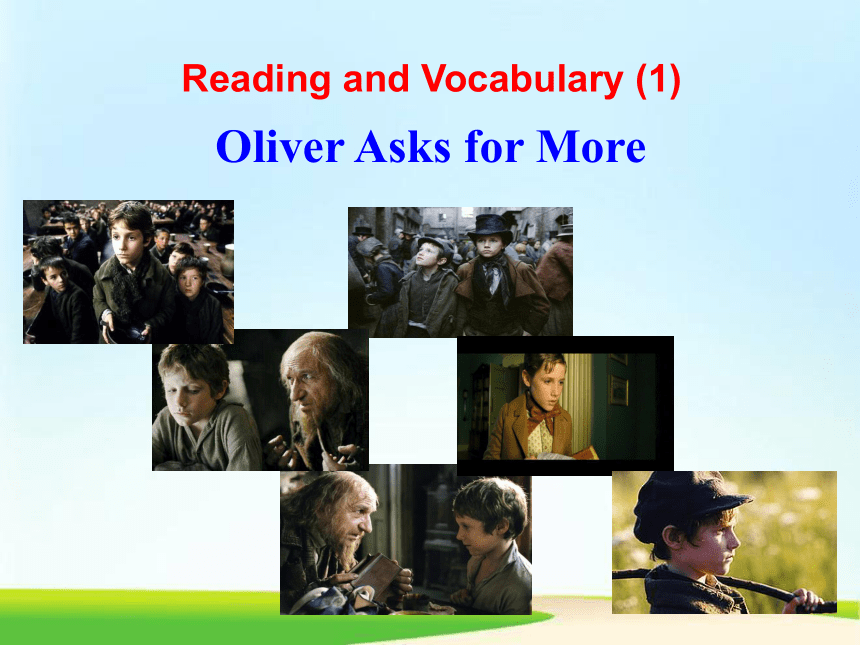
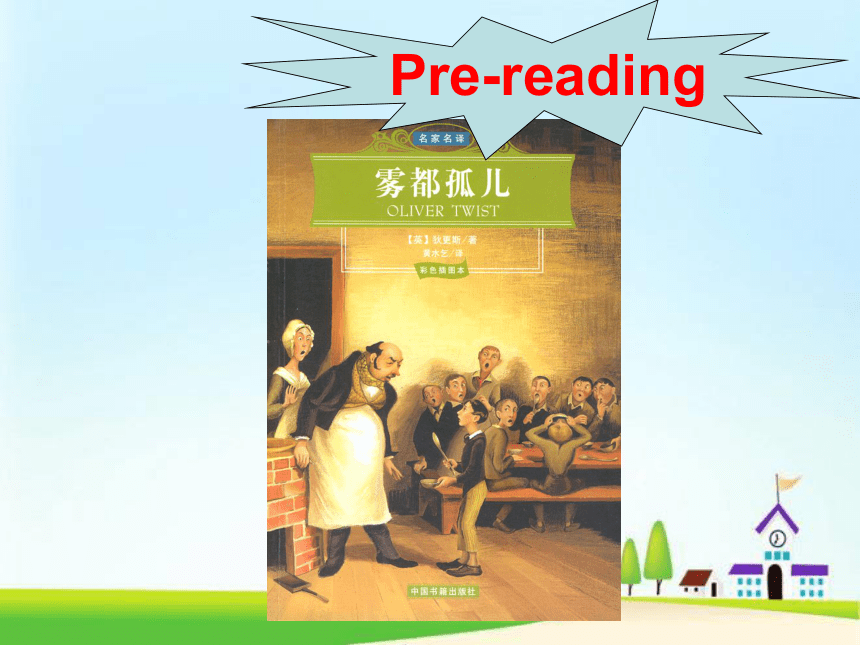
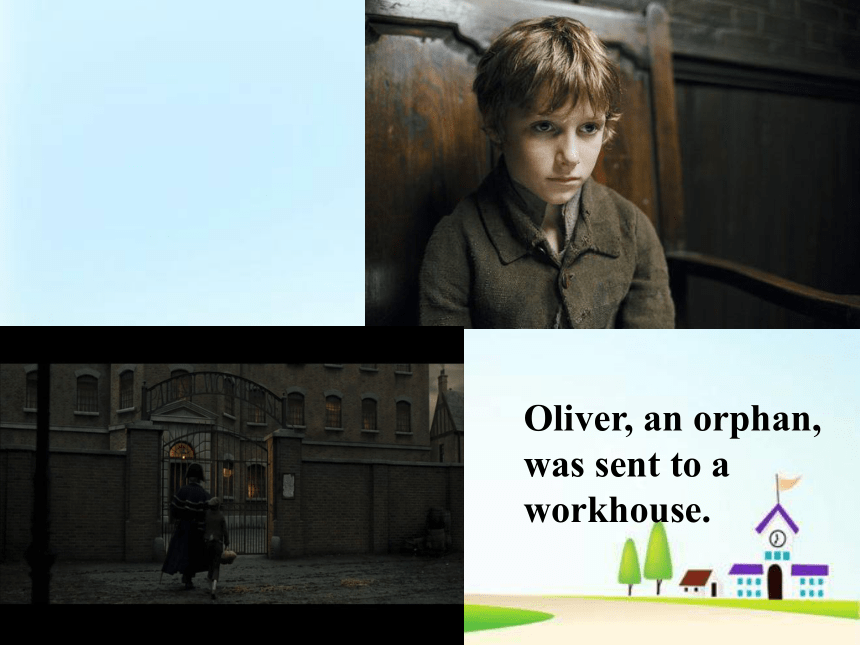
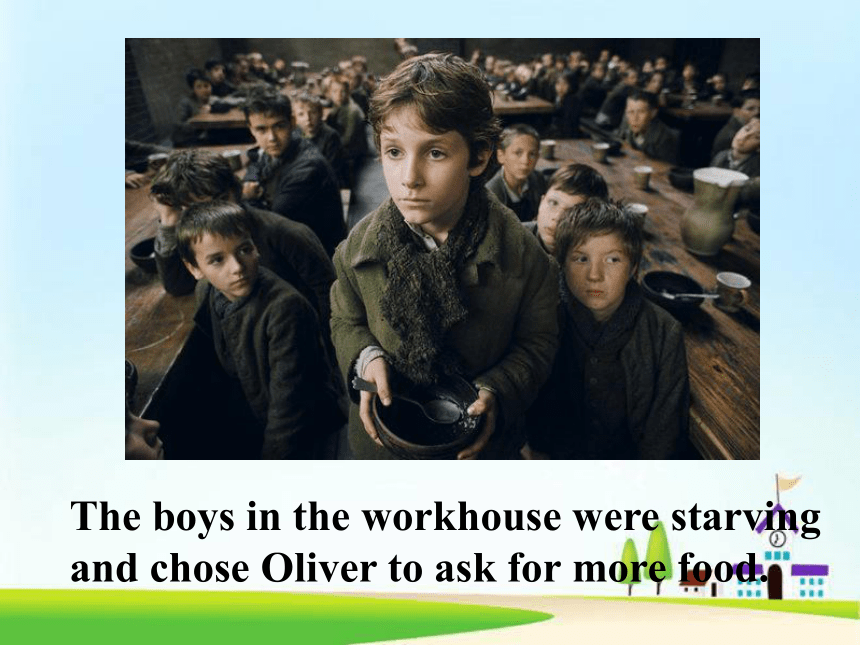
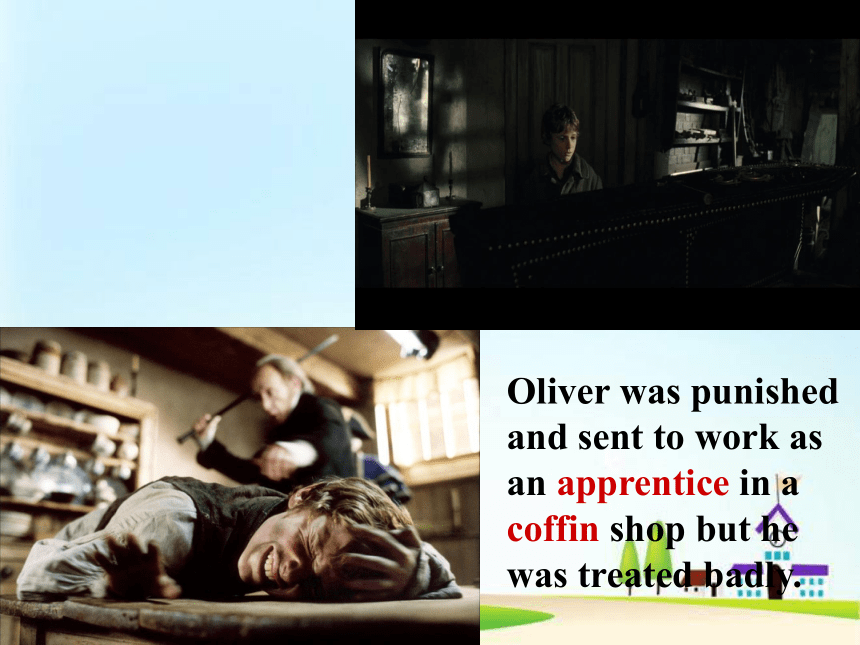
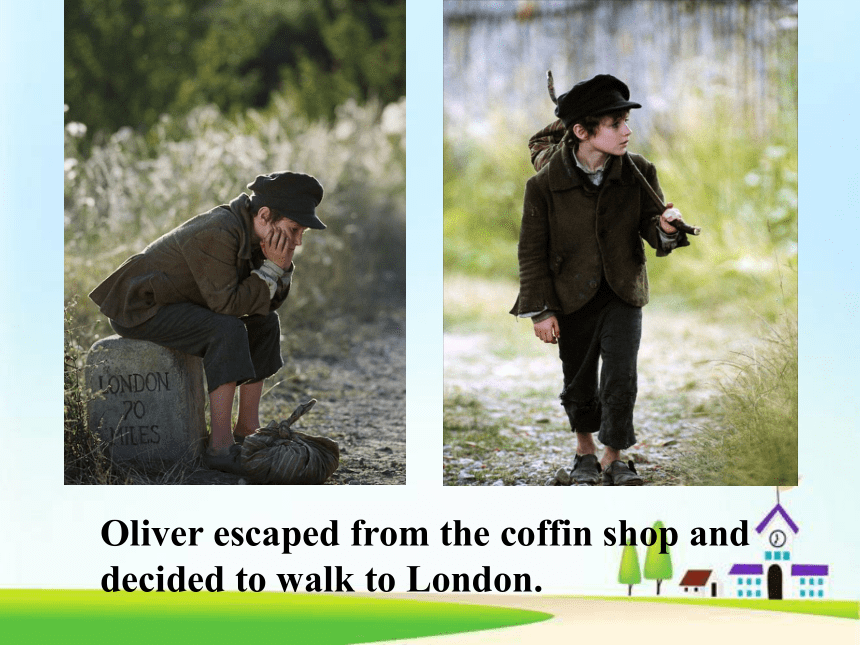
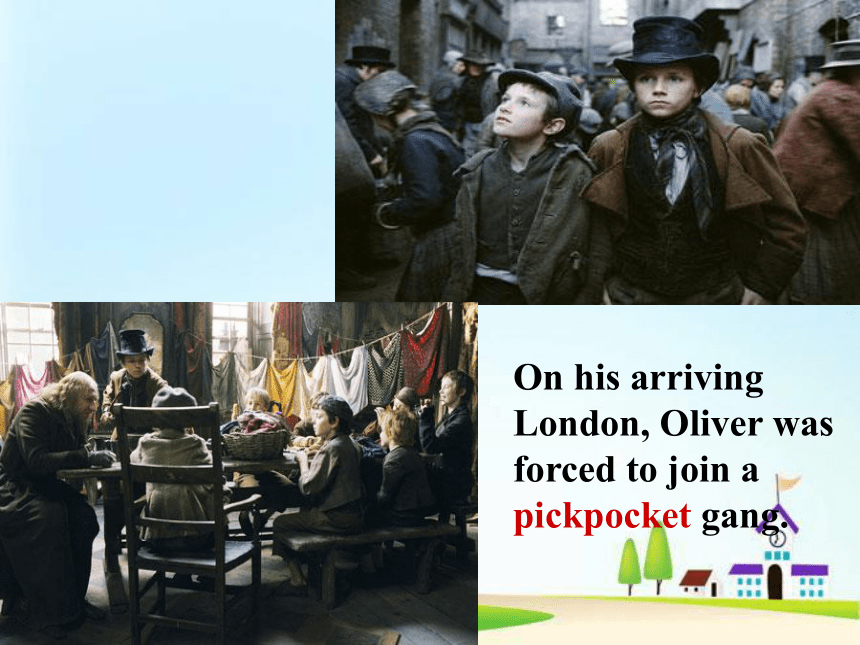
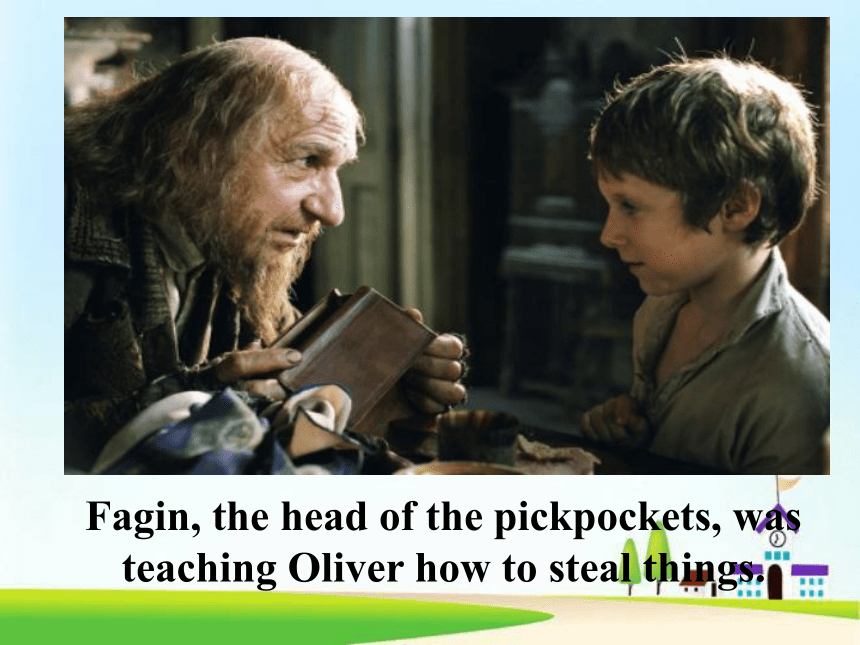
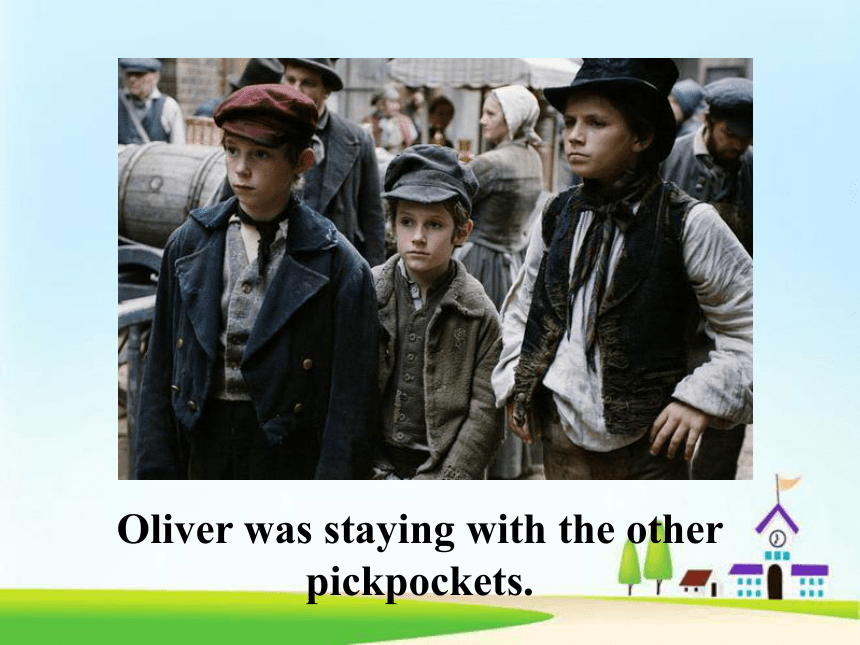
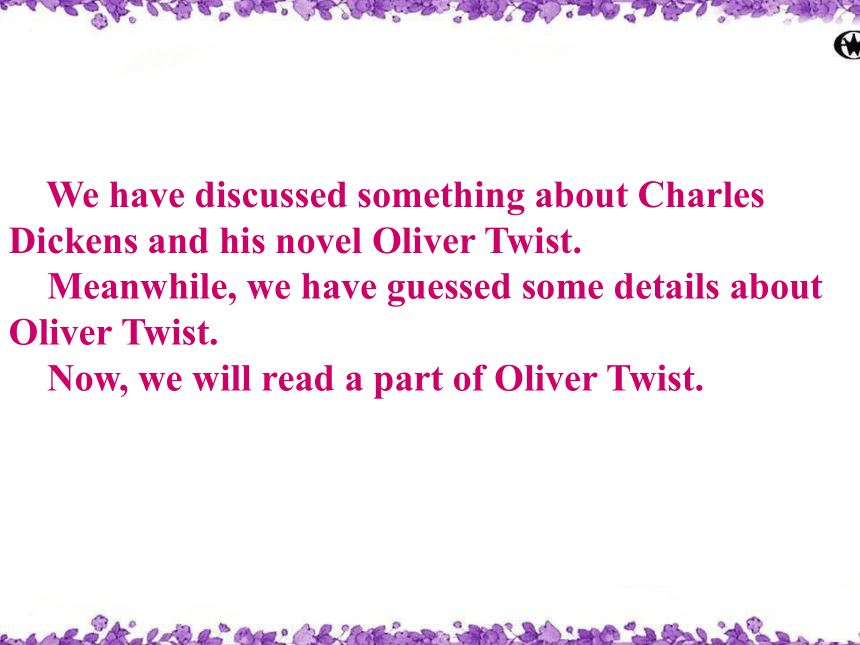
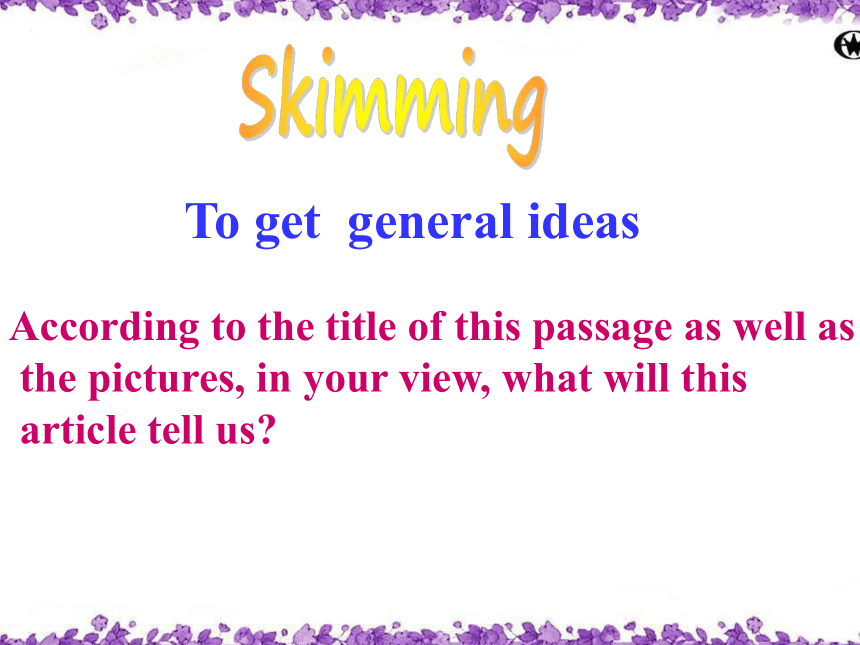
文档简介
课件74张PPT。Module 3 Literature Oliver Asks for MoreReading and Vocabulary (1)Pre-readingOliver, an orphan, was sent to a workhouse.The boys in the workhouse were starving and chose Oliver to ask for more food.Oliver was punished and sent to work as an apprentice in a coffin shop but he was treated badly.Oliver escaped from the coffin shop and decided to walk to London.On his arriving London, Oliver was forced to join a pickpocket gang.Fagin, the head of the pickpockets, was teaching Oliver how to steal things.Oliver was staying with the other pickpockets. We have discussed something about Charles
Dickens and his novel Oliver Twist.
Meanwhile, we have guessed some details about
Oliver Twist.
Now, we will read a part of Oliver Twist. To get general ideasSkimmingAccording to the title of this passage as well as
the pictures, in your view, what will this
article tell us?What did Oliver ask for? And why?SkimmingOliver asked for more food, because Oliver Twist and his companions in the workhouse were very hungry.The living condition of the boys was very poor and there they suffered from hunger badly.main idea of each partWhy Oliver was chosen to ask for more food and what Oliver said to the warden that evening.Why the warden hit Oliver on the head and how Oliver was treated by the managers of the workhouse.1.Para.12.Para.
2-33.para .4-13Oliver Asks for More The beginning of the film: The boys became quite wild with hunger Children chose Oliver to ask for more soup and he did so Oliver was locked in a room and maybe would be hanged Scanning1 When were the boys allowed to eat another 60 grams of bread?
A. At weekend.
B. On special holidays.
C. On everyone’s birthday.
D. Every day.2 The warden’s face became very pale because he ___.
A. was a fat man
B. was in complete astonishment
C. could not stand
D. was frightened
3 When Oliver repeated his words, the warden ____.
A. held on to the pot to support
B. stared in complete astonishment at
the boy
C. hit the boy on the head with the soup
spoon
D. ran out of the roomTrue or false2.The tall boy was not used to being hungry all the time.3.No one believed that the tall boy could eat that small boy.4.If the boys hadn’t been very hungry, they wouldn’t have chosen Oliver to ask for more food. 1.The boys in the workhouse were given one
bowl of soup and another 60 grams of bread
each day. The boys in the __________ were starving and chose Oliver Twist to ask for more ____. When Oliver did this, the workhouse managers were very _____ and ______ Oliver in a room. Everybody believed that Oliver would be ______.Summary of the passageworkhousefoodangrylockedhangedRead the passage and complete these sentences.1 On special holidays the boys were allowed to eat
___________________________.
2 The boys stared at the pot because
__________________________________________
3 The boys decided that one of them should ask
for more food because________________________
___________________________.
4 The warden’s face became very pale because
__________________________________.
another 60 grams of breadthey were very hungry and wanted more to eat. they thought one big boy would eat another small boyhe was astonished by what Oliver saidexercise5 When Oliver repeated his words, the warden _______________________________
6 Mr Bumble told the managers of the workhouse that_________________________
7 In order to punish Oliver, the managers ___________________
8 The managers did not want Oliver to____________________hit him on the head with the spoon.Oliver had asked for more.locked him in a room.stay in the workhouse.What can we learn from the passage?
Compared with Oliver, what do you think of our life today?
Discussionspeaking1.Read this text again and try to find out some important or difficult words and expressions.
2.Role-play: make up a dialogue about what happened? between Oliver and other boys and the warden.
3.Retell the story in brief words…Boys in the workhouse were always starving, for each one was allowed one bowl of soup. Three months later they became quite ______________. Finally they decided to _____ one ______ to ask for more food. _______ Oliver Twist _________ was chosen. In the evening, after Oliver ate his soup, he walked to the master and said, “Please sir, I want some more.” ________ had he spoken these words ________ the warden hit him on the head _____ the spoon. Then the managers of the workhouse had a meeting. Oliver was immediately _______ in a room. And the next morning a notice was _________ on the door, offering a ________ to anybody who would employ Oliver Twist. wild with hunger pick outIt was whoNo soonerthanlockedput uprewardwith1.feed v. 喂(养),饲养;养活,提供
feed on (动物)以…为主食,吃…过日子
猫头鹰以老鼠和其他小动物为食。
Owls feed on mice and other small animals.
feed sth. to sb./sth.=feed sb./sth. on/with sth.
用…喂养;给(人或动物)食物
大多数人用干果喂鹦鹉。
Most people feed nuts to parrots.
= Most people feed parrots on/with nuts.
be fed up with sth. 饱受, 厌烦
?我受够了你差劲的工作习惯.
?I?am?fed?up?with?your?poor?work?habits.? 【链接训练】
①Their mother can't afford to ________ them on meat and fish every day.
A.grow B.raise C.feed D.rise
【解析】 句意为:天天吃肉吃鱼,他们的母亲是供不起的。feed sb.on sth.“给……吃……”,是固定用法。
【答案】 C②Tigers ________ meat-eating animals ________ meat.
A.belong to;feed on
B.belonging to;feed on
C.are belonged to;feed on
D.belonging to;feeding on
【解析】 句意为:老虎属于肉食动物,以食肉为生。句中belonging to meat-eating animals作定语修饰tigers,belong to无被动式,feed on意为“以……为主食”。
【答案】 B2.serve v. ① 为…服务;服役;② 提供,端上(饭菜等)
归纳拓展
(1) serve as (= work as, act as) 担任,当作,起…作用
serve to do sth. 用来做…
这张旧沙发只好用作客人的床了。
The old couch had to serve as a guest bed.
(2) serve sb. (with) sth. = serve sth. to sb.
用某物招待某人,给人端上…
服务生给我们倒酒。
The waiter served us (with) wine.
=The waiter served wine to us.
service n.服务
at your service 愿为您效劳;听候您的吩咐
你要是需要什么,请尽管吩咐。
If you need anything,I am at your service.
【链接训练】
①As a matter of fact, this sofa is now an antique which served______a bed in the past.
A.as B.for C.to D.with
【解析】 考查serve as“可用作,担当,作为”的用法。句意为:事实上,这个现在是古董的沙发在过去被用作床。
【答案】 A② The weather station________warn people of the coming of strong winds and predict their movement.
A.serves to B.serves for C.serves as D.services
【解析】 句意为:该气象台的职责是提醒人们强风的来临,并预测其动向。for与as后都要用名词或动名词,所以首先排除B、C两项;service“服务”,为名词,也要排除,故选A,serve to do sth.“用来做……”。
【答案】 A 3.The bowls never needed washing, as the
boys cleaned them with their spoons, trying to
eat every bit of soup.
粥碗从来用不着洗,因为孩子们非用汤匙把碗刮
得重又明光铮亮了才住手,试图吃掉每一点粥。句式分析
这个句子包含一个由as引导的原因状语从句,从
句中又含有一个伴随状语 “trying to eat every
bit of soup”。(1) need doing = need to be done “某事需要被做”
The shirt needs washing.
(=The shirt needs to be washed.)
衬衫需要洗了。
The TV needs mending again.
(=The TV needs to be mended again.)
这台电视机需要再修理一下。(2) As 的用法:
As you were out, I left a message.
He noticed someone nodding to him as he got off the bus.
3. He told them to watch carefully and do as he did.
4. Old as he is, he works as energetically as young
people.
5. As is announced in today’s paper, he is to visit China
next Monday.当…时,随着 = when照…方式正如,如同尽管,虽然 = though因为,由于 = becauseThe bowls never needed washing, as the boys cleaned them with their spoons, trying to eat every bit of soup.
2. This never took very long, as the spoons were almost as large as the bowls.
3. There was one boy who was tall for his age , and was not used to being hungry all the time, as his father had kept a small cook shop.
4. “I never was more sure of anything in my life,” said the gentleman, as he knocked at the door.
判断文中as的意思。因为,由于 = because因为,由于 = because因为,由于 = because当…时,随着 = when 4....,they would sit staring at the pot
with eager eyes, as if they wanted to
eat it.
……,他们便会坐着,用渴望的眼神盯着那口
锅,好像要把它吃掉似的。
would表示过去的一种习惯
在过去,一遇到麻烦他就会在那里
一坐就是几个小时。
5. stare at 盯着看,凝视
考点提炼句子仿造In the past, when in trouble, he wouldsit there for hours.6.eager adj. 热切的,渴望的
归纳拓展
(1) be eager for sth. 渴望得到某物
他渴望着工作,因为没有工作他不敢想象他今后的生活。
He was eager for work,for he could not imagine his life
without it.
(2) be eager (for sb.) to do sth.
渴望(某人)做某事,极想(某人)做某事
克莱拉急于讲述她的看法.
Clara was eager to tell her opinion.
(3) be eager+that…(should) + v. 渴望做…
我渴望他们能赢。
I'm eager that they (should) win.
eagerness n.渴望,渴求
with eagerness 殷切地【链接训练】
Having been________to see her son for a long time,the mother became________.
A.eager;eager B.anxious;anxious
C.eager;anxious D.anxious;eager
【解析】 anxious与eager是相近的形容词;eager带有更多的热切的情绪,而anxious带有焦虑的情绪。根据句意,选C。
【答案】 C 7. appetite n.
① a desire or wish to have something, esp. food 胃口,食欲
Don’t eat chocolate; it will spoil your appetite.
② a desire or liking for a particular activity 欲望, 喜爱
have an appetite for 喜爱,渴望
She has an appetite for reading books. 8. starve v.
1) to suffer or die from great hunger 挨饿
They got lost in the desert and starved to death.
2) not having sth. that you need 缺乏…,急需…
These flowers are starving for water and sun .
starvation n. 9. be wild with hunger 由于饥饿而疯狂
with 可以表示原因, 意为“因为,由于”。如:
(1) He face was red with cold.
她的脸冻红了。
(2) He turned white with anger.
他气得脸煞白。
be wild with joy 欣喜若狂
With的其他意思:
She lives with her parents.
He looked at the girl with red hair with a hurt expression.
The meal with wine came to $20 each.
Cut it with a knife.
和,同,跟有,具有,带有包括用,使用,凭借 1.The room in which the boys were fed was a large stone hall, with a large pot at one end.
2. When they had cleaned their bowls in this way, they would sit staring at the pot with eager eyes, as if they wanted to eat it.
3. The warden stood by the pot with his assistants in a line
behind him.
4. Oliver, who was desperate with hunger and misery, rose
from the table and walked towards the master with his
bowl and spoon in his hand.
5. The bowls never needed washing, as the boys cleaned them with their spoons, trying to eat every bit of soup.
有,具有,带有有,具有,带有和,同,跟因为,由于有,具有,带有判断以下句子中with的意思。用,使用,凭借 10. There was one boy who was tall for his age, and was not used to being hungry all the time…
be/get used to doing 习惯于
请注意这里的to是介词,后面接名词或动名词。
He’s been used to the climate here.
She’s been used to getting up very early.used?to?do sth. 过去常常表示过去习惯性的动作或状态,但如今已不存在。
Mother?used?not?to?be?so?forgetful.
She?used?to?take?a?walk after supper.
--- How do you often go to school?
--- I ____ take a bus, but now I ____ walking.
A. used to; used to
B. was used to; am used to
C. used to; am used to
D. am used to; used to C 11. The tall boy had a wild, hungry look in his eye and everyone believed him.
believe… 相信(某人说的话)
believe in… 信任(某人);信仰(宗教/理论/鬼神)
I believe him.(=I believe what he says)
我相信他(的话)。 I believe in him.(=I trust him )
我相信他是一个可以信得过的人。(即:我信任他)
He has never believed in ghosts.
None of his companions believed him.12.pick out ①挑选出,捡出;②辨别出,认出
他给我挑选了一个熟透了的桃子。
He picked out the ripest peach for me.
你能在这群人中认出你的妹妹吗?
Can you pick out your sister in this crowd?
精讲拓展:
pick up ① 拾起,捡起
②(无意中)学会,染上(坏习惯)
③ 用车接某人
④ 接收(节目等)
⑤ 改善,好转
⑥ 得到,买到活学巧练:
________all the words in the first paragraph that describe the battle.
A.Pick up B.Work out
C.Pick out D.Choose from
答案与解析:C 挑出,找出。 13. whisper v. 耳语;私语;密谈
whisper sth. to sb. = whisper sb. sth. 向某人低声说
詹姆斯俯身跟迈克低声说了些什么。
James leaned over to whisper something to Mike.
whisper sth. in one’s ear 跟某人耳语某事
她对他低声说了些话。
She whispered something in his ear.
n. 低语,耳语
in a whisper / in whispers 耳语地,低声地
“他们就要来了,”他压低声音激动地说。
“They’re coming,” he said in an excited whisper.
14. nudge v.
to push sb. gently with one’s elbow in order to call a person’s attention (用肘)轻推, 轻触
他用胳膊肘轻碰了下朋友,让他知道是时候离开了。
He nudged his friend to let him know it was time to leave.15.in astonishment 惊讶地;吃惊地 = in surprise
她吃惊地盯着他。
She stared at him in astonishment.
精讲拓展:
to one‘s astonishment令某人吃惊的是
astonish v.使吃惊,惊讶
be astonished at / by sb./sth. 对……吃惊, 感到惊讶
to find/hear/learn/see sth.
that…
这则消息令每一个人都惊讶。
Everybody was astonished at/by the news.
我们惊讶地发现该寺庙仍完好无损。
We were astonished to find the temple still in its original
condition.
what astonishes sb. is...令某人吃惊的是……
令我惊讶的是他竟记得我的名字。
what astonishes me is that he remembered my name.② in的相关短语
in silence 寂静地
in private 私下地;秘密地
in anger 发怒地
in satisfaction 满意地
in anxiety 焦急地
in pain 疼痛地
in excitement 激动地16. hold on to
① 抓紧,不放开
抓住栏杆,否则你会滑倒的!
Hold on to the rail or you will slip!
② 守住,保住, 不送/卖某物
你应该继续保留住你的石油股份。
You should hold on to your oil shares.17. support
n. ① There is strong public support for the change.
② Her family and friends have given her lots of support.
③ The supports under the bridge were starting to bend.
v. ① These measures are strongly supported by the environmental groups.
② Several major companies are supporting the project.
③ The bridge is supported by two stone columns.
④ How can you support a family on such a low salary?支持,拥护帮助,援助支撑物,支柱支持,拥护资助,帮助支撑,承受(重量)养活,抚养18. in a …voice 用…声音(说), …声地
e.g. in a high / low/ soft / weak / loud voice19.seize v. 抓住;抢去;占领;抓住(机
会);理解
归纳拓展
seize sth. from sb.从某人那里夺取某物
玛丽从他手上把信抢过去,开始大声朗读起来。
Mary seized the letter from him and began to read
out loud.
seize a chance/an opportunity 抓住机会/机遇
抓住机会,否则你会后悔的。
Seize the chance, or you’ll regret it.
我不太明白他话中的意思。
I couldn’t seize the meaning of his remarks.【链接训练】
George ________ the good opportunity to hand his suggestion to the director,and at last,it was accepted.
A.covered B.seized C.thought D.held
【解析】 “抓住机会”常译为seize a chance或seize an opportunity。
【答案】 B20.hang v.
① 悬挂,吊着 (hang-hung-hung-hanging)
② 绞死,吊死(hang-hanged-hanged-hanging)
墙上挂着一幅漂亮的图画。
On the wall hangs a beautiful picture.
他被判以谋杀罪而被处以绞刑。
He was convicted of murder and hanged for
his crime.【链接训练】
—Where is your raincoat?
—Mine ________ behind the door.
A.is hanging B.is hanged
C.hung D.hanged
【解析】 hang意为“吊死,绞死”时其过去式、过去分词为hanged,hanged,故B、D两项错误;C项时态与语境不符。句意为:——你的雨衣在哪里?——我的雨衣正挂在门后。由题意可知A项正确,hang此处为不及物动词。
【答案】 A 21. reward
n. 报酬,奖金
in reward (for...) 作为报答…,作为奖赏…
他因表现勇敢而获得了一枚奖章。
He received a medal in reward for his bravery.
v. 酬劳,奖赏, 报答
reward sb. for sth. 因某事而奖赏某人
reward sb. with sth. 用某物酬谢某人
他因学习成绩优秀而受到学校的奖赏。
The school rewarded him with a prize for
excellence in his studies.
活学活用
A £100 has been offered for the
return of the necklace.
A.reward B.title
C.prize D.gift
解析 reward奖赏,奖金;title称号;prize奖 项;gift礼物。句意为:已悬赏100英镑找寻项链。A1. Not until at least thirty seconds had passed, was the man able to speak.
2. No sooner had the boy spoken these words than the warden hit him on the head with the soup spoon.
3. Never have I heard anything like it!
朗读4-13段,找出倒装句,翻译 1. Not until at least thirty seconds had passed, was the man able to speak.
not …until 结构主要有两个用法,以下面的句子为例:
He didn’t return until two hours later.
倒装结构
Not until two hours later did he return.
强调句中
It was not until two hours later that he
returned.
2. No sooner had the boy spoken these words than the warden hit him on the head with the soupspoon.
这是倒装句,正常语序是: The boy had no sooner spoken these words than the warden hit him on the head with the soup spoon.
no sooner had sb. done… than sb. did :
一…就…(位于句首时,使用倒装结构)
No sooner had he gone to sleep than the
telephone rang once more.
We had no sooner reached the door than he
came back.
类似结构还有:
hardly /scarcely had sb. done… when sb. did : 一…就…
We had hardly got in when it began to rain.
Hardly had he arrived when she started complaining. 他一出门,雨就开始下了。
I had hardly left home when it began to rain.
= Hardly had I left home when it began to rain.
He had no sooner left home than it began to rain.
= No sooner had he left home than it began to rain.归纳拓展
表示“一……就……”的句型
(1) hardly...when,scarcely...when,no sooner...than,引导时间状语从句时主句通常用过去完成时,从句用一般过去时;hardly/scarcely/no sooner位于句首时,用部分倒装语序。(2) as soon as,the moment,the minute,the
instant,immediately,directly
我一得到结果就告诉你。
I’ll tell you the result immediately I get it.
(3) on+名词/动名词
on his arrival他一到就……
on hearing the news一听到这消息就……
他们一到英国便被乘火车带去水晶宫。
On arriving in England,they were taken to the
Crystal Palace by train.
(4) at+名词
at the sight of一看到……就……
一看到这个场景,他就情不自禁地想起他的家乡。
At the sight of the scene,he couldn’t help thinking
of his hometown.
【链接训练】
No sooner ______ his talk than he ______ the workers.
A.he finished;surrounded by
B.did he finish;surrounded by
C.had he finished;was surrounded by
D.he had finished;was surrounded by
【解析】 no sooner...than...是一个固定句式,与no sooner连用的时态是过去完成时,且no sooner置于句首,该分句用部分倒装,故选C。句意为:他刚讲完话,就被工人围起来了。
【答案】 C3. 否定词或半否定词 位于句首时句子要倒装。
这类词或短语主要有:never, neither, nor, little, seldom, rarely, hardly, scarcely, no sooner, not only, in no way, at no time, few, not, no等, 如:
Not a word did I say to him.
Never have I found him so happy.
Little does he care about what I said.
I can’t swim. Neither can he.
No sooner had he gone to bed than he fell asleep. Hardly ____ the airport when the plane
took off.
A. I had arrived at B. had I arrived
C. had I reached D. I had got to
2) -- Have you ever seen anything like that
before?
-- No, _____ anything like that before.
A. I never have seen B. never I have seen
C. never have I seen D. I have seen
3) She is not fond of cooking; ____ I.
A. so am B. nor am
C. neither D. nor doCCBa huge amount of 大量的
归纳拓展
英语中有些表示“许多,大量”的短语,后接可数名词与不可数名词情况不同,归纳如下:注意:the number of虽与a number of只有一词之差,但它表示“……的数量”,作主语时谓语动词用单数。【链接训练】
①________ food has been sent to the local people after the earthquake happened.
A.Quantities of B.A large number of
C.A huge amount of D.A great many
【解析】 首先要排除B、D两项,因为B、D后要加可数名词;若选A项,句中谓语动词应用复数。故C项正确。
【答案】 C②Jack has a large ________ of books while Tom has a large ________ of money.
A.amount;number B.number;amount
C.plenty;amount D.amount;lot
【解析】 a large number of+可数名词复数,此题中books是可数名词且为复数形式;money为不可数名词,a large amount of+不可数名词。故正确答案为B。
【答案】 BVideo TimeOliver Asks for More
Dickens and his novel Oliver Twist.
Meanwhile, we have guessed some details about
Oliver Twist.
Now, we will read a part of Oliver Twist. To get general ideasSkimmingAccording to the title of this passage as well as
the pictures, in your view, what will this
article tell us?What did Oliver ask for? And why?SkimmingOliver asked for more food, because Oliver Twist and his companions in the workhouse were very hungry.The living condition of the boys was very poor and there they suffered from hunger badly.main idea of each partWhy Oliver was chosen to ask for more food and what Oliver said to the warden that evening.Why the warden hit Oliver on the head and how Oliver was treated by the managers of the workhouse.1.Para.12.Para.
2-33.para .4-13Oliver Asks for More The beginning of the film: The boys became quite wild with hunger Children chose Oliver to ask for more soup and he did so Oliver was locked in a room and maybe would be hanged Scanning1 When were the boys allowed to eat another 60 grams of bread?
A. At weekend.
B. On special holidays.
C. On everyone’s birthday.
D. Every day.2 The warden’s face became very pale because he ___.
A. was a fat man
B. was in complete astonishment
C. could not stand
D. was frightened
3 When Oliver repeated his words, the warden ____.
A. held on to the pot to support
B. stared in complete astonishment at
the boy
C. hit the boy on the head with the soup
spoon
D. ran out of the roomTrue or false2.The tall boy was not used to being hungry all the time.3.No one believed that the tall boy could eat that small boy.4.If the boys hadn’t been very hungry, they wouldn’t have chosen Oliver to ask for more food. 1.The boys in the workhouse were given one
bowl of soup and another 60 grams of bread
each day. The boys in the __________ were starving and chose Oliver Twist to ask for more ____. When Oliver did this, the workhouse managers were very _____ and ______ Oliver in a room. Everybody believed that Oliver would be ______.Summary of the passageworkhousefoodangrylockedhangedRead the passage and complete these sentences.1 On special holidays the boys were allowed to eat
___________________________.
2 The boys stared at the pot because
__________________________________________
3 The boys decided that one of them should ask
for more food because________________________
___________________________.
4 The warden’s face became very pale because
__________________________________.
another 60 grams of breadthey were very hungry and wanted more to eat. they thought one big boy would eat another small boyhe was astonished by what Oliver saidexercise5 When Oliver repeated his words, the warden _______________________________
6 Mr Bumble told the managers of the workhouse that_________________________
7 In order to punish Oliver, the managers ___________________
8 The managers did not want Oliver to____________________hit him on the head with the spoon.Oliver had asked for more.locked him in a room.stay in the workhouse.What can we learn from the passage?
Compared with Oliver, what do you think of our life today?
Discussionspeaking1.Read this text again and try to find out some important or difficult words and expressions.
2.Role-play: make up a dialogue about what happened? between Oliver and other boys and the warden.
3.Retell the story in brief words…Boys in the workhouse were always starving, for each one was allowed one bowl of soup. Three months later they became quite ______________. Finally they decided to _____ one ______ to ask for more food. _______ Oliver Twist _________ was chosen. In the evening, after Oliver ate his soup, he walked to the master and said, “Please sir, I want some more.” ________ had he spoken these words ________ the warden hit him on the head _____ the spoon. Then the managers of the workhouse had a meeting. Oliver was immediately _______ in a room. And the next morning a notice was _________ on the door, offering a ________ to anybody who would employ Oliver Twist. wild with hunger pick outIt was whoNo soonerthanlockedput uprewardwith1.feed v. 喂(养),饲养;养活,提供
feed on (动物)以…为主食,吃…过日子
猫头鹰以老鼠和其他小动物为食。
Owls feed on mice and other small animals.
feed sth. to sb./sth.=feed sb./sth. on/with sth.
用…喂养;给(人或动物)食物
大多数人用干果喂鹦鹉。
Most people feed nuts to parrots.
= Most people feed parrots on/with nuts.
be fed up with sth. 饱受, 厌烦
?我受够了你差劲的工作习惯.
?I?am?fed?up?with?your?poor?work?habits.? 【链接训练】
①Their mother can't afford to ________ them on meat and fish every day.
A.grow B.raise C.feed D.rise
【解析】 句意为:天天吃肉吃鱼,他们的母亲是供不起的。feed sb.on sth.“给……吃……”,是固定用法。
【答案】 C②Tigers ________ meat-eating animals ________ meat.
A.belong to;feed on
B.belonging to;feed on
C.are belonged to;feed on
D.belonging to;feeding on
【解析】 句意为:老虎属于肉食动物,以食肉为生。句中belonging to meat-eating animals作定语修饰tigers,belong to无被动式,feed on意为“以……为主食”。
【答案】 B2.serve v. ① 为…服务;服役;② 提供,端上(饭菜等)
归纳拓展
(1) serve as (= work as, act as) 担任,当作,起…作用
serve to do sth. 用来做…
这张旧沙发只好用作客人的床了。
The old couch had to serve as a guest bed.
(2) serve sb. (with) sth. = serve sth. to sb.
用某物招待某人,给人端上…
服务生给我们倒酒。
The waiter served us (with) wine.
=The waiter served wine to us.
service n.服务
at your service 愿为您效劳;听候您的吩咐
你要是需要什么,请尽管吩咐。
If you need anything,I am at your service.
【链接训练】
①As a matter of fact, this sofa is now an antique which served______a bed in the past.
A.as B.for C.to D.with
【解析】 考查serve as“可用作,担当,作为”的用法。句意为:事实上,这个现在是古董的沙发在过去被用作床。
【答案】 A② The weather station________warn people of the coming of strong winds and predict their movement.
A.serves to B.serves for C.serves as D.services
【解析】 句意为:该气象台的职责是提醒人们强风的来临,并预测其动向。for与as后都要用名词或动名词,所以首先排除B、C两项;service“服务”,为名词,也要排除,故选A,serve to do sth.“用来做……”。
【答案】 A 3.The bowls never needed washing, as the
boys cleaned them with their spoons, trying to
eat every bit of soup.
粥碗从来用不着洗,因为孩子们非用汤匙把碗刮
得重又明光铮亮了才住手,试图吃掉每一点粥。句式分析
这个句子包含一个由as引导的原因状语从句,从
句中又含有一个伴随状语 “trying to eat every
bit of soup”。(1) need doing = need to be done “某事需要被做”
The shirt needs washing.
(=The shirt needs to be washed.)
衬衫需要洗了。
The TV needs mending again.
(=The TV needs to be mended again.)
这台电视机需要再修理一下。(2) As 的用法:
As you were out, I left a message.
He noticed someone nodding to him as he got off the bus.
3. He told them to watch carefully and do as he did.
4. Old as he is, he works as energetically as young
people.
5. As is announced in today’s paper, he is to visit China
next Monday.当…时,随着 = when照…方式正如,如同尽管,虽然 = though因为,由于 = becauseThe bowls never needed washing, as the boys cleaned them with their spoons, trying to eat every bit of soup.
2. This never took very long, as the spoons were almost as large as the bowls.
3. There was one boy who was tall for his age , and was not used to being hungry all the time, as his father had kept a small cook shop.
4. “I never was more sure of anything in my life,” said the gentleman, as he knocked at the door.
判断文中as的意思。因为,由于 = because因为,由于 = because因为,由于 = because当…时,随着 = when 4....,they would sit staring at the pot
with eager eyes, as if they wanted to
eat it.
……,他们便会坐着,用渴望的眼神盯着那口
锅,好像要把它吃掉似的。
would表示过去的一种习惯
在过去,一遇到麻烦他就会在那里
一坐就是几个小时。
5. stare at 盯着看,凝视
考点提炼句子仿造In the past, when in trouble, he wouldsit there for hours.6.eager adj. 热切的,渴望的
归纳拓展
(1) be eager for sth. 渴望得到某物
他渴望着工作,因为没有工作他不敢想象他今后的生活。
He was eager for work,for he could not imagine his life
without it.
(2) be eager (for sb.) to do sth.
渴望(某人)做某事,极想(某人)做某事
克莱拉急于讲述她的看法.
Clara was eager to tell her opinion.
(3) be eager+that…(should) + v. 渴望做…
我渴望他们能赢。
I'm eager that they (should) win.
eagerness n.渴望,渴求
with eagerness 殷切地【链接训练】
Having been________to see her son for a long time,the mother became________.
A.eager;eager B.anxious;anxious
C.eager;anxious D.anxious;eager
【解析】 anxious与eager是相近的形容词;eager带有更多的热切的情绪,而anxious带有焦虑的情绪。根据句意,选C。
【答案】 C 7. appetite n.
① a desire or wish to have something, esp. food 胃口,食欲
Don’t eat chocolate; it will spoil your appetite.
② a desire or liking for a particular activity 欲望, 喜爱
have an appetite for 喜爱,渴望
She has an appetite for reading books. 8. starve v.
1) to suffer or die from great hunger 挨饿
They got lost in the desert and starved to death.
2) not having sth. that you need 缺乏…,急需…
These flowers are starving for water and sun .
starvation n. 9. be wild with hunger 由于饥饿而疯狂
with 可以表示原因, 意为“因为,由于”。如:
(1) He face was red with cold.
她的脸冻红了。
(2) He turned white with anger.
他气得脸煞白。
be wild with joy 欣喜若狂
With的其他意思:
She lives with her parents.
He looked at the girl with red hair with a hurt expression.
The meal with wine came to $20 each.
Cut it with a knife.
和,同,跟有,具有,带有包括用,使用,凭借 1.The room in which the boys were fed was a large stone hall, with a large pot at one end.
2. When they had cleaned their bowls in this way, they would sit staring at the pot with eager eyes, as if they wanted to eat it.
3. The warden stood by the pot with his assistants in a line
behind him.
4. Oliver, who was desperate with hunger and misery, rose
from the table and walked towards the master with his
bowl and spoon in his hand.
5. The bowls never needed washing, as the boys cleaned them with their spoons, trying to eat every bit of soup.
有,具有,带有有,具有,带有和,同,跟因为,由于有,具有,带有判断以下句子中with的意思。用,使用,凭借 10. There was one boy who was tall for his age, and was not used to being hungry all the time…
be/get used to doing 习惯于
请注意这里的to是介词,后面接名词或动名词。
He’s been used to the climate here.
She’s been used to getting up very early.used?to?do sth. 过去常常表示过去习惯性的动作或状态,但如今已不存在。
Mother?used?not?to?be?so?forgetful.
She?used?to?take?a?walk after supper.
--- How do you often go to school?
--- I ____ take a bus, but now I ____ walking.
A. used to; used to
B. was used to; am used to
C. used to; am used to
D. am used to; used to C 11. The tall boy had a wild, hungry look in his eye and everyone believed him.
believe… 相信(某人说的话)
believe in… 信任(某人);信仰(宗教/理论/鬼神)
I believe him.(=I believe what he says)
我相信他(的话)。 I believe in him.(=I trust him )
我相信他是一个可以信得过的人。(即:我信任他)
He has never believed in ghosts.
None of his companions believed him.12.pick out ①挑选出,捡出;②辨别出,认出
他给我挑选了一个熟透了的桃子。
He picked out the ripest peach for me.
你能在这群人中认出你的妹妹吗?
Can you pick out your sister in this crowd?
精讲拓展:
pick up ① 拾起,捡起
②(无意中)学会,染上(坏习惯)
③ 用车接某人
④ 接收(节目等)
⑤ 改善,好转
⑥ 得到,买到活学巧练:
________all the words in the first paragraph that describe the battle.
A.Pick up B.Work out
C.Pick out D.Choose from
答案与解析:C 挑出,找出。 13. whisper v. 耳语;私语;密谈
whisper sth. to sb. = whisper sb. sth. 向某人低声说
詹姆斯俯身跟迈克低声说了些什么。
James leaned over to whisper something to Mike.
whisper sth. in one’s ear 跟某人耳语某事
她对他低声说了些话。
She whispered something in his ear.
n. 低语,耳语
in a whisper / in whispers 耳语地,低声地
“他们就要来了,”他压低声音激动地说。
“They’re coming,” he said in an excited whisper.
14. nudge v.
to push sb. gently with one’s elbow in order to call a person’s attention (用肘)轻推, 轻触
他用胳膊肘轻碰了下朋友,让他知道是时候离开了。
He nudged his friend to let him know it was time to leave.15.in astonishment 惊讶地;吃惊地 = in surprise
她吃惊地盯着他。
She stared at him in astonishment.
精讲拓展:
to one‘s astonishment令某人吃惊的是
astonish v.使吃惊,惊讶
be astonished at / by sb./sth. 对……吃惊, 感到惊讶
to find/hear/learn/see sth.
that…
这则消息令每一个人都惊讶。
Everybody was astonished at/by the news.
我们惊讶地发现该寺庙仍完好无损。
We were astonished to find the temple still in its original
condition.
what astonishes sb. is...令某人吃惊的是……
令我惊讶的是他竟记得我的名字。
what astonishes me is that he remembered my name.② in的相关短语
in silence 寂静地
in private 私下地;秘密地
in anger 发怒地
in satisfaction 满意地
in anxiety 焦急地
in pain 疼痛地
in excitement 激动地16. hold on to
① 抓紧,不放开
抓住栏杆,否则你会滑倒的!
Hold on to the rail or you will slip!
② 守住,保住, 不送/卖某物
你应该继续保留住你的石油股份。
You should hold on to your oil shares.17. support
n. ① There is strong public support for the change.
② Her family and friends have given her lots of support.
③ The supports under the bridge were starting to bend.
v. ① These measures are strongly supported by the environmental groups.
② Several major companies are supporting the project.
③ The bridge is supported by two stone columns.
④ How can you support a family on such a low salary?支持,拥护帮助,援助支撑物,支柱支持,拥护资助,帮助支撑,承受(重量)养活,抚养18. in a …voice 用…声音(说), …声地
e.g. in a high / low/ soft / weak / loud voice19.seize v. 抓住;抢去;占领;抓住(机
会);理解
归纳拓展
seize sth. from sb.从某人那里夺取某物
玛丽从他手上把信抢过去,开始大声朗读起来。
Mary seized the letter from him and began to read
out loud.
seize a chance/an opportunity 抓住机会/机遇
抓住机会,否则你会后悔的。
Seize the chance, or you’ll regret it.
我不太明白他话中的意思。
I couldn’t seize the meaning of his remarks.【链接训练】
George ________ the good opportunity to hand his suggestion to the director,and at last,it was accepted.
A.covered B.seized C.thought D.held
【解析】 “抓住机会”常译为seize a chance或seize an opportunity。
【答案】 B20.hang v.
① 悬挂,吊着 (hang-hung-hung-hanging)
② 绞死,吊死(hang-hanged-hanged-hanging)
墙上挂着一幅漂亮的图画。
On the wall hangs a beautiful picture.
他被判以谋杀罪而被处以绞刑。
He was convicted of murder and hanged for
his crime.【链接训练】
—Where is your raincoat?
—Mine ________ behind the door.
A.is hanging B.is hanged
C.hung D.hanged
【解析】 hang意为“吊死,绞死”时其过去式、过去分词为hanged,hanged,故B、D两项错误;C项时态与语境不符。句意为:——你的雨衣在哪里?——我的雨衣正挂在门后。由题意可知A项正确,hang此处为不及物动词。
【答案】 A 21. reward
n. 报酬,奖金
in reward (for...) 作为报答…,作为奖赏…
他因表现勇敢而获得了一枚奖章。
He received a medal in reward for his bravery.
v. 酬劳,奖赏, 报答
reward sb. for sth. 因某事而奖赏某人
reward sb. with sth. 用某物酬谢某人
他因学习成绩优秀而受到学校的奖赏。
The school rewarded him with a prize for
excellence in his studies.
活学活用
A £100 has been offered for the
return of the necklace.
A.reward B.title
C.prize D.gift
解析 reward奖赏,奖金;title称号;prize奖 项;gift礼物。句意为:已悬赏100英镑找寻项链。A1. Not until at least thirty seconds had passed, was the man able to speak.
2. No sooner had the boy spoken these words than the warden hit him on the head with the soup spoon.
3. Never have I heard anything like it!
朗读4-13段,找出倒装句,翻译 1. Not until at least thirty seconds had passed, was the man able to speak.
not …until 结构主要有两个用法,以下面的句子为例:
He didn’t return until two hours later.
倒装结构
Not until two hours later did he return.
强调句中
It was not until two hours later that he
returned.
2. No sooner had the boy spoken these words than the warden hit him on the head with the soupspoon.
这是倒装句,正常语序是: The boy had no sooner spoken these words than the warden hit him on the head with the soup spoon.
no sooner had sb. done… than sb. did :
一…就…(位于句首时,使用倒装结构)
No sooner had he gone to sleep than the
telephone rang once more.
We had no sooner reached the door than he
came back.
类似结构还有:
hardly /scarcely had sb. done… when sb. did : 一…就…
We had hardly got in when it began to rain.
Hardly had he arrived when she started complaining. 他一出门,雨就开始下了。
I had hardly left home when it began to rain.
= Hardly had I left home when it began to rain.
He had no sooner left home than it began to rain.
= No sooner had he left home than it began to rain.归纳拓展
表示“一……就……”的句型
(1) hardly...when,scarcely...when,no sooner...than,引导时间状语从句时主句通常用过去完成时,从句用一般过去时;hardly/scarcely/no sooner位于句首时,用部分倒装语序。(2) as soon as,the moment,the minute,the
instant,immediately,directly
我一得到结果就告诉你。
I’ll tell you the result immediately I get it.
(3) on+名词/动名词
on his arrival他一到就……
on hearing the news一听到这消息就……
他们一到英国便被乘火车带去水晶宫。
On arriving in England,they were taken to the
Crystal Palace by train.
(4) at+名词
at the sight of一看到……就……
一看到这个场景,他就情不自禁地想起他的家乡。
At the sight of the scene,he couldn’t help thinking
of his hometown.
【链接训练】
No sooner ______ his talk than he ______ the workers.
A.he finished;surrounded by
B.did he finish;surrounded by
C.had he finished;was surrounded by
D.he had finished;was surrounded by
【解析】 no sooner...than...是一个固定句式,与no sooner连用的时态是过去完成时,且no sooner置于句首,该分句用部分倒装,故选C。句意为:他刚讲完话,就被工人围起来了。
【答案】 C3. 否定词或半否定词 位于句首时句子要倒装。
这类词或短语主要有:never, neither, nor, little, seldom, rarely, hardly, scarcely, no sooner, not only, in no way, at no time, few, not, no等, 如:
Not a word did I say to him.
Never have I found him so happy.
Little does he care about what I said.
I can’t swim. Neither can he.
No sooner had he gone to bed than he fell asleep. Hardly ____ the airport when the plane
took off.
A. I had arrived at B. had I arrived
C. had I reached D. I had got to
2) -- Have you ever seen anything like that
before?
-- No, _____ anything like that before.
A. I never have seen B. never I have seen
C. never have I seen D. I have seen
3) She is not fond of cooking; ____ I.
A. so am B. nor am
C. neither D. nor doCCBa huge amount of 大量的
归纳拓展
英语中有些表示“许多,大量”的短语,后接可数名词与不可数名词情况不同,归纳如下:注意:the number of虽与a number of只有一词之差,但它表示“……的数量”,作主语时谓语动词用单数。【链接训练】
①________ food has been sent to the local people after the earthquake happened.
A.Quantities of B.A large number of
C.A huge amount of D.A great many
【解析】 首先要排除B、D两项,因为B、D后要加可数名词;若选A项,句中谓语动词应用复数。故C项正确。
【答案】 C②Jack has a large ________ of books while Tom has a large ________ of money.
A.amount;number B.number;amount
C.plenty;amount D.amount;lot
【解析】 a large number of+可数名词复数,此题中books是可数名词且为复数形式;money为不可数名词,a large amount of+不可数名词。故正确答案为B。
【答案】 BVideo TimeOliver Asks for More
